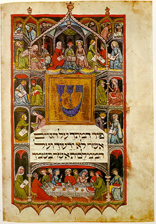Reflections
the Fast of the First-born
The fast of the first born is in remembrance of Hashem's mercy on the Jews during the 10th plague of skipping over their houses and therefore sparing their first borns.
On the night of the 15th of Nissan, HaKadosh Boruch Hu smote all the first-born in the land of Egypt. Chazal teach us that the plague affected all types of first-born; those born first to a mother or a father, sons or daughters, from the first-born of Pharaoh to the first-born of a lowly slave. The language of the Torah verses describing the plague states that; “there was no house in which nobody died”; from this, Chazal infer that in a house where there was no first-born present, the eldest son at the scene would die instead.
When HaKadosh Boruch Hu smote the first-born, He passed over the Jewish houses, and the first-born Jews were not smitten in the plague; indeed, even those Jews who were not in their homes at the time, even those who were in the home of an Egyptian, were saved. Although the plague was directed at all first-born, Jew and non-Jew alike, HaKadosh Boruch Hu had mercy on the first-born of Israel and saved them from death; therefore, first-born Jews have the custom of fasting on erev Pesach.
The source for this custom is to be found in maseches Sofrim, chapter 21, halocha 3. There it is written; “therefore, we do not say Tachanun any of the days of Nissan, and we do not fast until after Nissan, except the first-born who fast on erev Pesach….” The Talmud Yerushalmi, maseches Pesachim, also mentions the custom of fasting on erev Pesach, although there are alternative versions of the commentaries, in relation to the exact details of the subject.
Both a first-born to a father and to a mother are obligated to fast. Maran Rav Yosef Karo writes in Shulchan Oruch that even first-born daughters are obligated to fast, since the decree was also intended for them. However, the Rema disagrees, countering that in our days, the daughters have no requirement to fast, since today there is no such first-born status for females as there evidently once was. The Tur rules that although at the time of the plague, if there was no first-born in the house then the eldest would be smitten in his place, today there is no such corresponding practice of substituting the eldest for lack of a present first-born.
It is customary that if the first-born is still a minor and cannot fast, his father will fast in his stead. If the father is himself a first-born and as such is obligated to fast for himself, the poskim are divided as to whether the father’s fast than then be accounted to both himself and his son. Those who hold that the father cannot relieve his son of his obligation to fast if the father himself must fast, instead obligate the mother to fast in the child’s place.
Since the obligation to fast is a custom rather than a strict law, the possibility exists of exempting oneself from the fast by means of participating in a seudas mitzvah. In many places the custom is to make a seudas siyum masechta on erev Pesach, in order to exempt the first-born from the obligation to fast. These seudos are held in synagogues and many first-born participate, and then do not fast. There are those who say that since the gentiles have a custom to fast on the day before their seasonal holiday at this time of year, it is preferable for Jewish first-born to participate in a seudas mitzvah and not fast, so that it should not appear that we are following gentile custom. However, there are certain communities who are particular that the first-born should indeed fast and not participate in a seudos mitzva. In some of these communities there are even separate prayer quorums for the first-born, in which they follow an order of prayer similar to that of a communal fast; the Mishna Berura, however, rules that one should not conduct himself in such a way.
If the Seder night falls on Motzei Shabbos and the first-born are therefore unable to fast on erev Pesach, since we are not permitted to fast on Shabbos, there are those who annul the fast for that year, and do not specify an alternative day upon which the first-born should fast. However, the prevalent custom today is to advance the day of the fast to the Thursday before Pesach.
This custom of the first-born fasting on erev Pesach is one that is practised by almost all Jewish communities all over the world, although there are a few communities who do not have this tradition, such as the kehilla of Yemen.







